The nearly century-old Route 1 rambles for more than 500 miles through coastal and northern Maine, carrying millions of tourists each year between Kittery’s crowded clam huts to the sprawling forests and potato fields of Fort Kent.
In between the blueberry museums, ice cream stands, beaches and lobster shacks, tourists driving what could be called Vacationland’s Main Street are increasingly likely to spot a marijuana store – 22 of them at last count, with a new one opening almost every month.
Not just any tourist can patronize them, however. Only those with a state-issued medical card can shop there. Maine voters legalized recreational cannabis in 2016, but adult-use sales are not expected to start until March, making medical the only legal marijuana market in Maine – for now.
Most of these shops were not even here a year ago. The first of Maine’s eight state-licensed medical marijuana dispensaries opened in 2011. But it is Maine’s medical marijuana caregivers that are behind a wave of small retail shops opening since 2016, expanding patient access while pushing legal boundaries.
Some, like Beach Boys in South Portland, aim for a modern cannabis retail experience, with a brightly lit interior and a Dunkin’ Donuts next door. Others, like High and Mighty in Steuben, go for that Down East vibe, inviting rusticators to drive past piles of old lobster traps to sit for a spell on its knotty pine porch.
Until this summer, medical marijuana retailers sold mostly to Mainers. Tourists hailing from a state that allowed for medical marijuana use there could get a Maine-issued visiting patient card here, but only the most experienced tourists knew to initiate the lengthy by-mail process in advance of their visit.
Paul McCarrier of Legalize Maine, who operates 1 Mill on Route 1 in Belfast, lobbied to change Maine’s visiting patient system, calling it unnecessary and confusing. Other states have deemed these patients eligible, he noted. And most tourists know Maine had legalized all forms of adult marijuana use in 2016.
“I had to turn away many visiting patients last summer, including three people who thought they had completed the process,” McCarrier said. “The visiting patients were initially confused, and then became very angry.’
In June, Maine enacted a new state law making it easier for card-carrying tourists to buy their medical marijuana here, eliminating the need for all that advance paperwork as long as their home state allows them to buy their medicine while traveling out of state.
The enhanced reciprocity law is the latest change to the state’s 20-year-old medical marijuana program. What began in 1999 as a grow-your-own allowance has morphed into a nationally recognized network of eight state-licensed dispensaries and about 2,500 medical marijuana caregivers.
Until this year, patients had to demonstrate a qualifying condition, like AIDS or Alzheimer’s, to qualify for a doctor’s medical marijuana certification, but now they can get a doctor’s approval for any medical reason. Nationally, most patients use medical marijuana to address chronic pain, tremors and nausea. Some cannabis products high in THC can create a high for the user, while cannabidiol, or CBD, products that are often made from hemp tout relief without a high.
A GROWING CUSTOMER BASE
The new reciprocity law greatly expands Maine’s medical marijuana consumer base. On its own, Maine has never had more than 50,000 patients. The new law makes it possible for card-carrying patients from 25 states, from Alaska to Washington, to buy here with ease, with more states being added every day.
Last week, after working out some regulatory details, Maine added Massachusetts to its reciprocity list. That’s a big add for Maine’s medical cannabis industry because Massachusetts accounts for more than one out of every five overnight visitors to Maine. With its addition, all of New England can now buy in Maine.

Your Green Thumb in Kittery. Penelope Overton/Staff Writer
This has translated into a sales boost for some, but not all, of the state’s Route 1 cannabis businesses.
Your Green Thumb in Kittery welcomes many tourists into its shop. Although the town forbids any marijuana-related signs, a small sandwich board touting CBD products informs eagle-eyed motorists they are passing Maine’s first cannabis shop on northbound Route 1.
Your Green Thumb has sold to patients who are visiting from as far away as California and Nevada, but staff who work inside the snug little shop say the bulk of out-of-state customers hail from New England, with most coming from New Hampshire and Massachusetts.
“Tourists are really excited about Maine marijuana,” said budtender Alex Griffin. “Maine has that reputation for top quality cannabis. And I would be lying if I didn’t say they love Maine’s low prices, too. Top quality for a lot less than they pay at home.”
Prices for many popular medical marijuana strains in Maine are lower compared to other states.

Indico medical marijuana booth in Kittery. Shawn Patrick Ouellette/Staff Photographer
For example, an eighth of an ounce of Blue Dream, a wildly popular hybrid marijuana strain favored for daytime treatment of pain, depression and nausea, can be picked up for as little as $33 in Maine, but will set a consumer back $48 in Philadelphia and $50 in Massachusetts.
Like most things marijuana, because it’s still illegal on a federal level, every state medical program has a unique set of do’s and don’ts. For example, medical marijuana can’t be smoked in New York or Ohio, or eaten in New Jersey. Patients from those states are often eager to sample Maine’s flower and chocolates.
The Maine Office of Marijuana Policy does expect visiting patients to follow their home state rules, and Maine’s, which would mean a card-carrying New Yorker shouldn’t buy smokable medicine here, but it won’t be policing that aspect of the law, or expect Maine shops to do it, a spokesman said.
STARTING AT THE BORDER
Kittery is home to two Route 1 cannabis shops – Your Green Thumb and Southern Maine Apothecary, a home-based operation that discreetly advertises its presence with a simple, wooden roadside sign – and one cannabis education kiosk run out of a parking lot on most weekends.
Caregiver Mitch Delaney is mounting a one-man marijuana informational campaign amid the weekly jam sessions, yoga classes and craft brew tastings that go down in the food truck lot of what’s known as Kittery’s mural building.
“We started doing this to educate Kittery, to teach them that recreational cannabis isn’t something to freak out about, but it’s turned into a tourist thing, too,” Delaney said. “A lot of people from away know Maine legalized, but don’t realize they can’t buy it here yet. We educate and advocate.”
If someone stops by with an out-of-state medical card, Delaney is only too happy to refer them to Indico, the medical marijuana caregiver business that he runs out of his Kittery house. He doesn’t sell from his information table, but he will deliver to someone who learns about him there.
Maine has launched a “Good to Know” public education campaign, but the campaign focuses on public health warnings and what is legally permissible, not on where tourists can buy it – and the Maine Office of Tourism has no tourist-themed marketing campaign in the works.
Instead, card-carrying tourists turn to online services, like Weedmaps and Leafly, even though many of Maine’s smaller shops can’t afford their steep ad rates, or a friendly Airbnb host or hotel concierge. Or they can simply stop at the first roadside shop they see, as if buying lobster or ice cream.

A SOUTHERN MAINE DESERT
Heading north on Route 1, a canna-curious tourist leaving Kittery enters a virtual marijuana desert. The southern Maine area is home to plenty of caregivers, and two state-sanctioned dispensaries, but coastal municipal planners are trying hard to keep marijuana off Route 1 to protect their family-friendly image.
Tourists sampling Stonewall Kitchen jams, walking the Marginal Way or hoping for a glimpse of a Bush visiting the presidential compound won’t find a medical cannabis shop on Route 1 in York, Ogunquit or either of the Kennebunks, and planners there say that is by design.
Forty-seven miles up the road in South Portland, just before Route 1 leaves the city streets of the metro area behind to merge with Interstate 295, is Beach Boys Clean Cannabis. They get their share of tourists, but it’s nothing like the owners’ other shop, Fire on Fore, which enjoys the tourist allure of Portland’s Old Port.
While most tourists make a stop in Portland, and could visit one of the many medical shops opened by caregivers, gas up at a marijuana filling station, or shop the state’s largest medical dispensary, Wellness Connection, they’d have to abandon Route 1 here, as well as in Brunswick and Bath.
Wellness operates four Maine dispensaries, but none can claim a Route 1 address. Sales to out-of-state tourists have doubled across the chain since the new reciprocity law went into effect, but only make up about 4 percent of total business.
Now that it allows walk-ins, Wellness welcomes a lot more “canna-curious folks stopping in to just look around,” said Executive Director Patricia Rosi. Most day trippers don’t have medical cards, so they walk away with a bag of non-psychoactive CBD products. As a result, CBD sales have gone up dramatically.
MIDCOAST MARIJUANA
Route 1 doesn’t get any greener until Woolwich, a full 32 miles to the north. It is home to two caregiver shops, Holistic Alternatives and Farley’s Cannabis Farm. The former operates out of a one-time Chinese restaurant, while the latter was built from the ground up by one of its owners, a retired builder.
Tourists walk into Farley’s almost every day, according to Sayra Small. Some come carrying their out-of-state medical cards and end up sitting down with Small, who works with them to find the right strain or delivery method to mirror the medical regimen they established back home.
“You’d think it would be easy to care for an out-of-state patient, because they probably know what works for them, but it’s hard to achieve the same results when you carry different products,” Small said. “I treat every visiting patient like a new one, a first-timer, even though I may only treat them once.”
But others leave empty-handed, and sometimes upset, because they assumed they could buy in any shop since Maine had voted to legalize adult-use cannabis three years ago, Small said. Disappointed walk-ins have told staff they’d decided to come to Maine just to check out its marijuana scene.

Farley’s Cannabis Farm in Woolwich Penelope Overton/Staff Photographer
From Woolwich to Ellsworth, cannabis tourists with medical cards will have a field day. More than half of Maine’s Route 1 medical cannabis shops can be found on this 100-mile stretch of the midcoast, including a handful that are openly courting the tourist crowd.
The mix of overstuffed Subarus and spotless BMWs parked at the heliotrope-hued Higher Vibes trailer in Thomaston on an August weekday hailed from seven states. Visitors posed for selfies in front of the trailer, which sells cannabis out of one side and gemstones out of the other. A food truck shares the lot.
Down the road, Scrimshaw owner Nick Westervelt estimates 25 percent of his sales in his first summer on Rockland’s Main Street have been made to out-of-state patients. Many have summered in the region for years, living in family-owned houses on the islands served by the local ferry line.
Westervelt spends as much time educating his customers, local and tourist alike, about marijuana as he does selling it. Retail customers can see the cannabis plants used to create the medicine, and watch as a grower tends to them, through glass windows that look out from the shop into the grow room.
“Being on Route 1, on Main Street, is about more than foot traffic and sales,” said Westervelt. “It’s about exposure, about public acceptance, not just for what I’m doing or what I’m selling, but for those who rely on the plant for their wellness and for marijuana culture in general.”
“Bringing it out into the open,” he said. “That’s how you win the hearts and minds.”
Some midcoast spots are staying local. At Highbrow in Waldoboro, a gorgeous wood-and-glass location that touts itself as “a classy joint,” tourists account for less than 3 percent of sales. Those who do venture in are experienced cannabis users who consume in much the same way as in-state patients, owners said.
“Maine’s program is much more accessible than other states,” said co-owner Noah Rosen. “Patients have been impressed with how many options they have and how affordable prices are compared to their home state.”
Northbound motorists pass Sweet Relief in Northport, whose owner posts tourist-friendly video tours to YouTube. Belfast hosts two Route 1 shops, 1 Mill and The Herbalist. Tourists crossing over the Penobscot Narrows Bridge will spot Green Island Herb, a welcoming home-based shop on tiny Verona Island.
Upon hitting Ellsworth, tourists will need keen eyes to spot Main Street Medical in a brick storefront. At this point, some tourists will peel off Route 1 and head to Bar Harbor or Acadia. They’ll pass other shops, including a state-licensed dispensary, en route to Jordan House popovers.
DOWN EAST AND THE COUNTY
The cannabis retail cornucopia of midcoast Maine ends here. Tourists that follow Route 1 Down East into the heart of Maine’s lobster industry expect the roadside stands to be dominated by ice cream, blueberries and Maine’s signature crustacean.

High and Mighty cabin in Steuben Penelope Overton/Staff Writer
Steuben is the lone exception. This community of 1,100 people located about halfway through the 60-mile stretch between Ellsworth and Machias hosts two pot shops, High Hopes and High and Mighty. That is a lot of marijuana for a town whose center is made up of a church, a library and a grammar school.
On this part of Route 1, which often bypasses the most scenic waterfronts found on its many peninsulas, a roadside sign advertising marijuana really stands out. It is enough to lure road-weary tourists down a long driveway lined with mounds of sea squirt-covered lobster traps to High and Mighty’s front porch.
“During the winter our customers were mostly all from Maine,” said owner Nick Couture, who opened his shop in December while waiting to get a lobster fishing license. “This summer we have seen lots of tourists from many states. Some don’t have medicinal marijuana so they stop in to take a picture in amazement.”
Lake Smoke Farms in Machias is at the easternmost end of the Atlantic Highway portion of Route 1 that hugs the Maine coast. Tourists following the well-trod lobster and lighthouse trail will often stop here to check out the local marijuana scene while doing a load of wash at the laundromat next door.
This is the last medical marijuana shop on the northbound Atlantic Highway segment of Route 1. About 20 miles farther, Route 1 will turn north and make its 200-mile trek to the roof of Maine, passing through Houlton, Presque Isle and Caribou along the Canadian border.
Motorists pass a stunning national wildlife refuge, and acres upon acres of potato fields, but only three cannabis shops: Highzenbudd, which is run out of a Monticello garage; Safe Alternatives, the state’s northernmost dispensary, in Caribou; and just opened Full Bloom Cannabis in Grand Isle.

David Wallingford poses for a photo among marijuana plants in the greenhouse of his medical marijuana business, Highzenbudd, in Monticello. Gregory Rec/Staff Photographer
“I am a pilgrim in an unholy land,” said David Wallingford, a transplanted southern Mainer who found Monticello while on a snowmobiling trip. “I grow weed where Donald Trump got 82 percent of the vote. That dark dark dark red place in the state of Maine? It’s where I live and I brought a weed grow here.”
Needless to say, Wallingford and his politics, which include surrounding his backyard grow with wood walls that have anti-Trump slogans painted on them, aren’t very popular with the town fathers, most of whom take breakfast at the diner across the road, alongside a posse of U.S. Border Patrol agents.
But it hasn’t slowed down business at Highzenbudd, a marijuana delivery service, church and cannabis store rolled into one. Everybody driving anywhere up here has to pass his business, an old convenience store, so the green cross banner he hangs from his second-story balcony is as loud as a neon sign.
“We look forward to expanding and putting people to work,” he said. “And growing killer weed.”
Not many tourists make it all the way from Kittery to Fort Kent, where Steve Rusnack launched his Full Bloom Cannabis shop. It is the last medical marijuana shop on Maine’s northbound Route 1, located just two blocks from the kitschy “America’s First Mile” sign at the Canadian border.
Fort Kent has prohibited recreational sales, but Grand Isle, where he recently opened up a second shop, has already approved recreational marijuana sales in theory, so he hopes to be able to attract Canadians heading south who right now can’t buy in Maine because their medical cards aren’t accepted.
“I didn’t choose Route 1 for the tourism,” said Rusnack, who estimates tourist purchases account for about 5 percent of his sales. “Up here, Route 1 is the only major road we’ve got. If you want anybody to know you’re here, even locals, you need to be on Route 1. I like the new law because it makes it easier, but it hasn’t moved the needle much for me in sales.”
Send questions/comments to the editors.


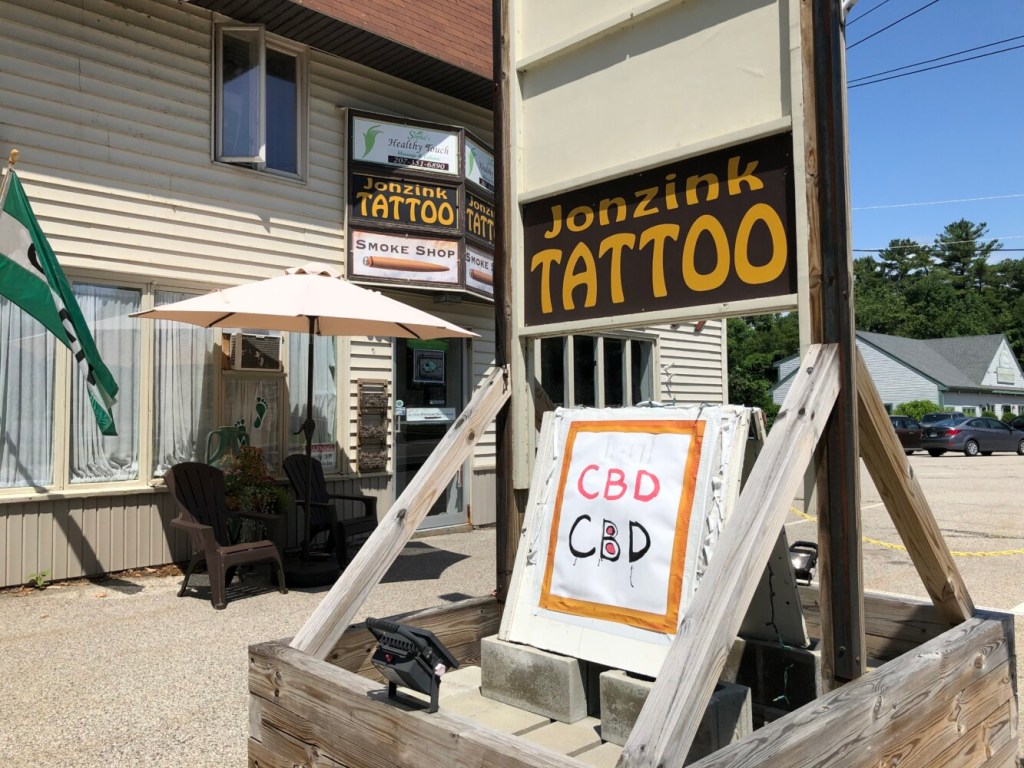
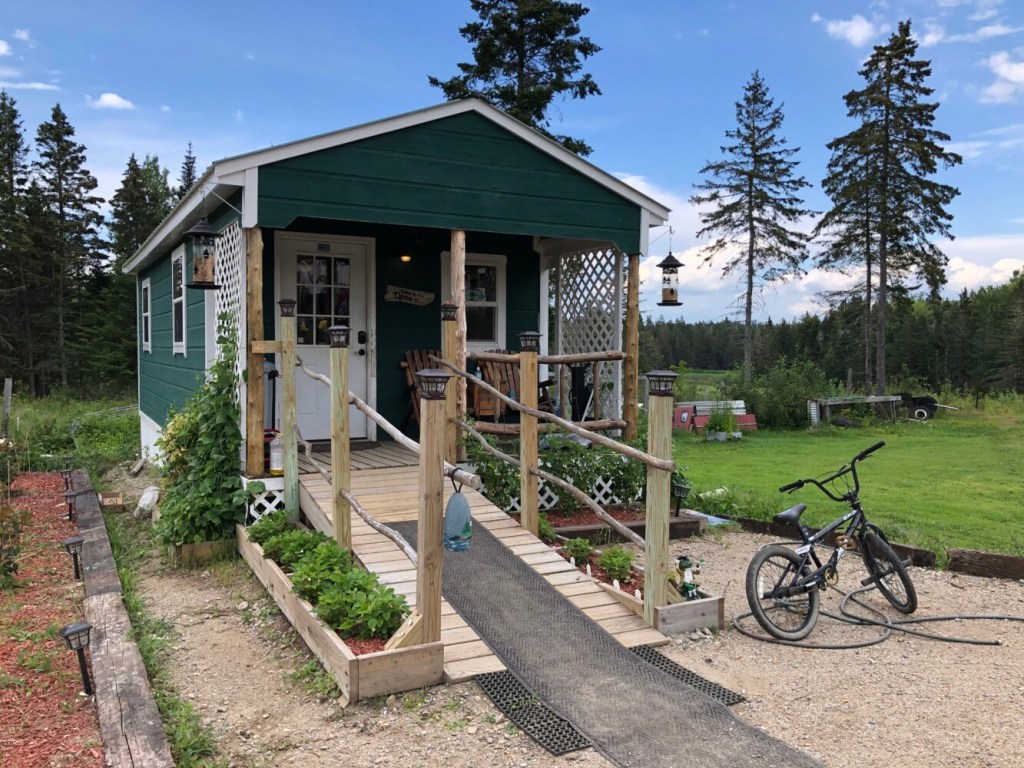
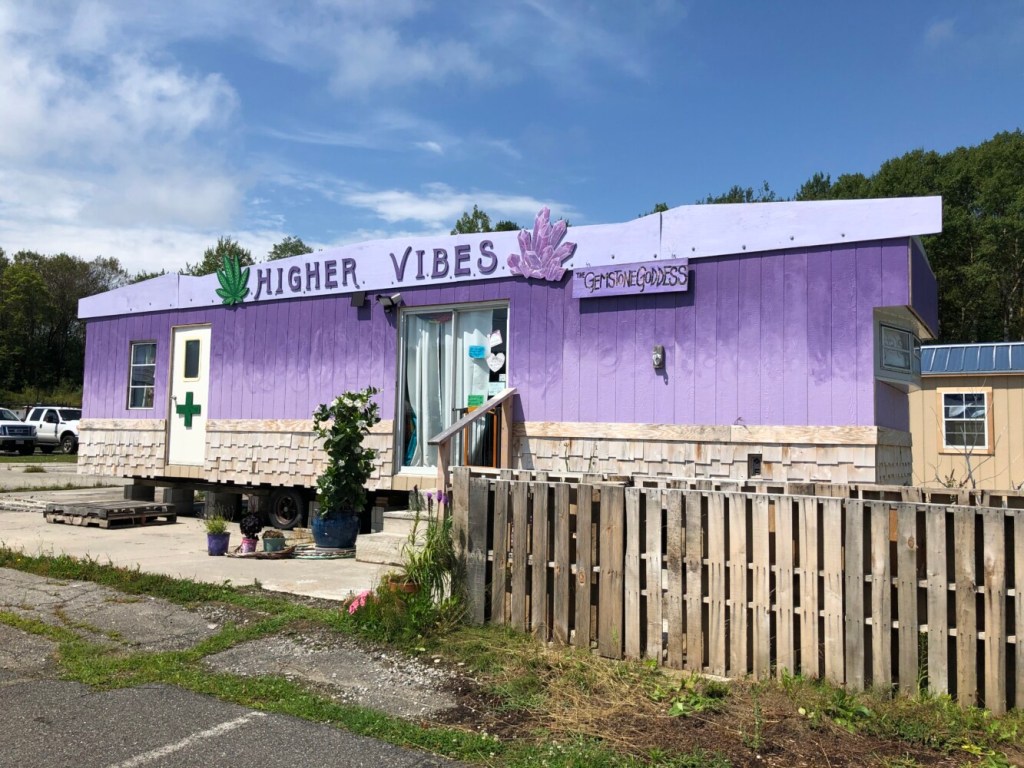
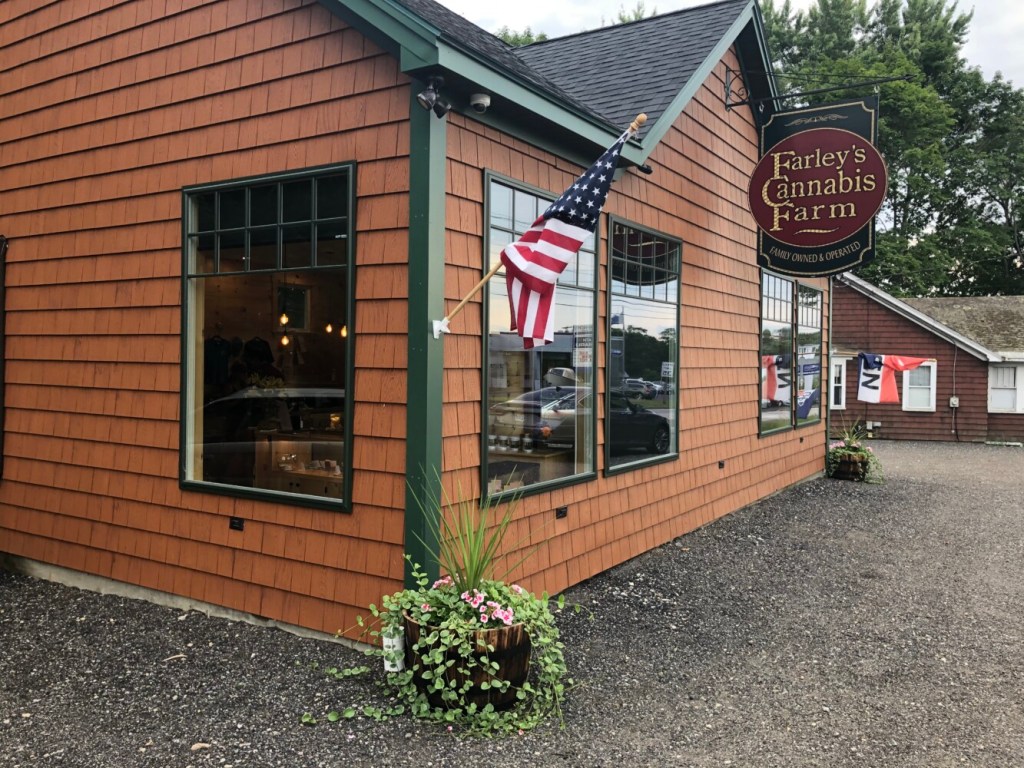
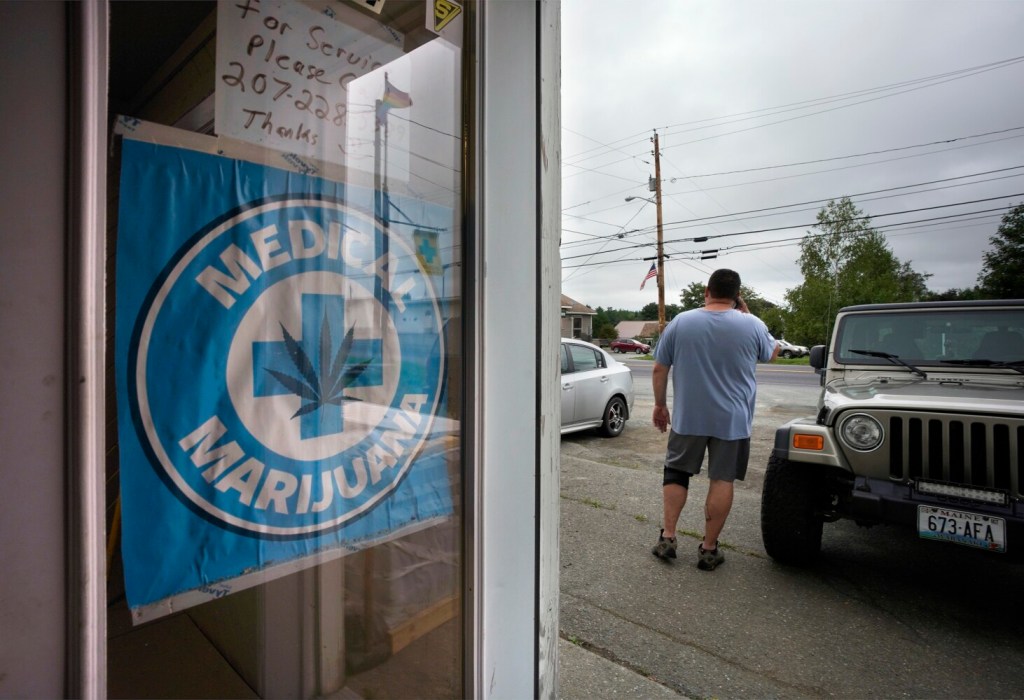
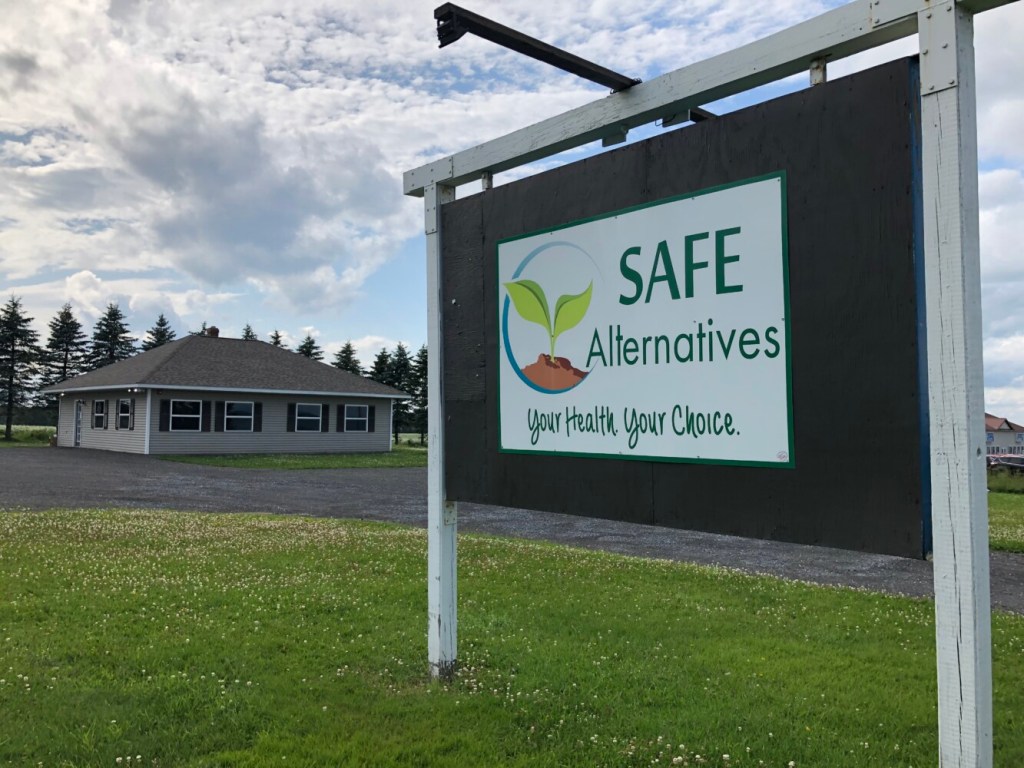

Success. Please wait for the page to reload. If the page does not reload within 5 seconds, please refresh the page.
Enter your email and password to access comments.
Hi, to comment on stories you must . This profile is in addition to your subscription and website login.
Already have a commenting profile? .
Invalid username/password.
Please check your email to confirm and complete your registration.
Only subscribers are eligible to post comments. Please subscribe or login first for digital access. Here’s why.
Use the form below to reset your password. When you've submitted your account email, we will send an email with a reset code.